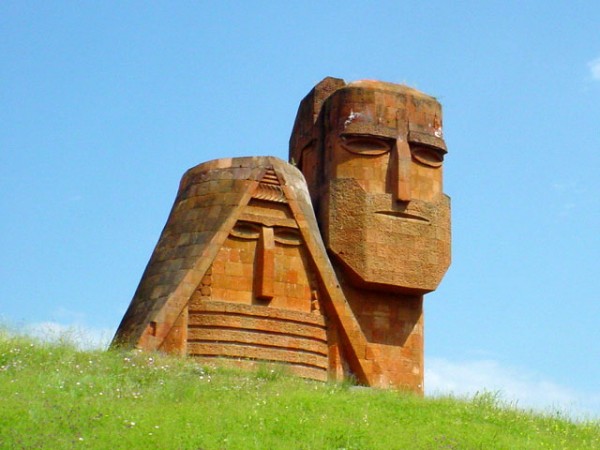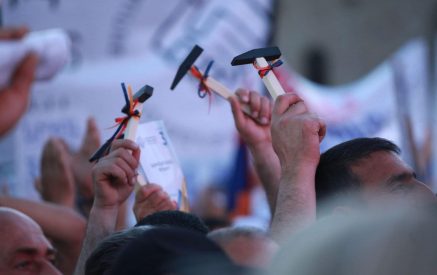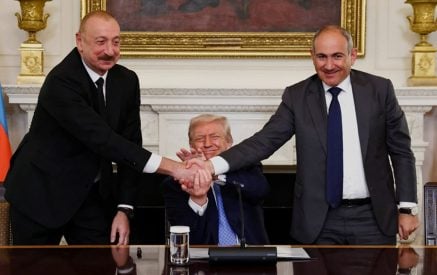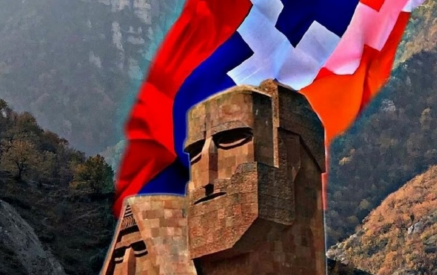Special for the Armenian Weekly
It has been more than two decades since the ceasefire created the de facto state of Artsakh (Nagorno-Karabagh Republic). During this same time-frame we have been forced to depend upon Russia as our principal proponent and supplier of military hardware. With Armenia securely under its control, Moscow’s relationship with Ankara and Baku ignores the basic fact that both countries are sworn enemies of Armenia and Armenian culture. For them, the genocide in one form or another has never ended.
A counterweight to this situation is the abundance of good will that is extended to Armenia and the Armenian people by many foreign governments. This has been responsible for many of these same governments and their lesser political entities to officially recognize the murderous enterprise that took the lives of some 1.5 million innocent Armenian men, women, and children as a genocide. Yet, given this reservoir of good will and with the genocide an established historic fact, we have been unable to convert this empathy into the required critical political support necessary for Artsakh’s de jure recognition.
Read also
Given this obvious dichotomy we still seem unable or perhaps unwilling to accept the distinction between recognizing the genocide and providing political support. Recognition is important, but it is an emotional victory that serves to assuage the hurt that has become part of our psyche. However, recognition requires no commitment. How many of these sovereign entities that have recognized the genocide support our claim to reparations from Turkey; have condemned Azerbaijan for breaching the norms of international behavior against Artsakh and Armenia; or have voted to recognized Artsakh as an independent state?
It is time we follow an appropriate Armenian proverb: “Tzur nstink, shitak khosink” (“Let’s sit crooked, but talk straight”).
While we have adhered to both the letter and the spirit of all provisions agreed to, Azerbaijan has never shown the same inclination. Azerbaijani President Ilham Aliyev is actively supported by Turkey’s President Recep Tayyip Erdogan who still retains significant influence. In addition, Aliyev seems to be insulated from repercussions for his constant violations. Given the history of Azerbaijan’s violations along the Line of Contact (LoC) it is evident that President Aliyev feels politically comfortable to set his own course with respect to Artsakh as well as Armenia. The very best response the Organization for Security and Co-operation in Europe (OSCE) Minsk Group co-chairs have been able to offer is to admonish both sides to display restraint.
Azerbaijan’s policy of provoking incidents along the LoC has evolved into a war of attrition against both Artsakh and Armenia. The LoC as well as the villages located in the border regions have become an active war zone. Innocent civilians routinely come under fire. A report released by Razm.info located in Armenia lists 165 Armenian soldiers (including patriotic volunteers) who were killed during 2016 as a result of constant violations by Azerbaijan. During the Four-Day War alone in April 2016, 91 Armenian soldiers died repelling these Azerbaijani attacks in the northern and southern sectors of the LoC. This full-scale offensive was the most egregious of Azerbaijan’s many egregious violations against Artsakh and Armenia. These deaths are occurring along a border where a ceasefire agreement is supposedly in effect. An agreement that is being willfully ignored by the Azerbaijani military. Just recently, three more Armenian soldiers were killed defending their positions against an Azerbaijani probing action in the Tavush region in northeastern Armenia, which is separated from Azerbaijan by an internationally recognized border. Not even the proven atrocities committed by the Azerbaijani military against our soldiers and innocent border villagers has warranted a condemnation against Azerbaijan from the Minsk Group countries through their representatives.
It is time for Armenian President Serge Sarkisian to stipulate that negotiations cannot be held or future meetings scheduled if Azerbaijan does not honor all agreements as well as conforming to the accepted norms of international behavior. Negotiation that may be in progress will be abruptly cancelled for the same reason. This policy should be announced in a major policy address. Not only must it be stated unequivocally, but no doubt should remain that it will be enforced. We may not have sufficient leverage to make demands, but neither should we hesitate to protect our national interests. Even with its problems, Armenia’s existence stabilizes the situation in the south Caucasus. It does not need to be said, but Moscow understands that its southern flank stretching from the Black Sea eastward into central Asia to China’s western border is anchored by Armenia. Russia runs the risk that selling Armenia short could very well unlock a Pandora’s Box of unexpected consequences.
It demeans our cause, that the Minsk Group countries support provisions that are openly partial to Azerbaijan’s interests. To require Artsakh to evacuate the liberated territories as a pre-condition, which if agreed to, would leave the remainder of Artsakh absolutely unable to defend against an Azerbaijani attack even with Armenian assistance. To also require that it should essentially relinquish its existing independence for some promised vote in the future to determine its status is beyond belief. Once that disastrous condition is met, there will be no guarantee as to the if, when, or how that vote will take place. Also, there has never been any indication or intention by the Minsk Group countries that Nagorno-Karabagh’s status (not Artsakh) would ever involve de jure recognition. Under the very best conditions conceivable, Nagorno-Karabagh would be reestablished as a dual ethnic exclave under Azerbaijani jurisdiction with a degree of cultural autonomy for the Armenians. Treaties, agreements, or third-power guarantees notwithstanding, within 10 years Azerbaijan would change the demographics and enforce policies that would transform Nagorno-Karabagh into another Nakhichevan devoid of Armenians and Armenian cultural artifacts.
From the beginning, Artsakh has not been a party to the negotiations. The obvious reason is that its declaration of independence has never been accepted by the mediating countries. The obvious question to be asked is why not? Simply because Azerbaijan has been steadfast in claiming that Armenia illegally invaded and continues to occupy its territory. This is the basis for its demand that its territorial integrity must be upheld. In the meantime, Armenia has done very little to effectively refute this mischaracterization by Azerbaijan.
It is absolutely necessary that Yerevan effectively refute Azerbaijan’s right to invoke the principle of territorial integrity. Armenia intervened to protect its people in Artsakh from a developing genocide. It was both a humanitarian response to the ongoing danger and a moral decision to invoke the Responsibility to Protect (R2P) principle. The R2P principle lays the responsibility on the government to protect its minorities from harm (genocide, ethnic cleansing, war crimes, etc.) within its territory.
With respect to the Armenian minority in Azerbaijan the harm (pogroms and atrocities) were incited by the government itself, thus preventing the protection the R2P principle should have provided. There was little time for Armenia to seek international assistance in the rapidly developing situation that not only threatened the lives of the Armenian minority, but had already caused numerous and horrific deaths. Azerbaijan has purposely framed Armenia’s moral and humanitarian based intervention as an invasion. Armenia’s intervention does not rise to the level of an irredentist issue. Allowing Azerbaijan to frame the dispute this way elevates territorial integrity as the central issue to be resolved rather than the real issue which is Artsakh’s right to independence under the principle of self-determination. This is a situation that we still fail to understand or worse, to acknowledge.
Given the sacrifices that our people have made; the blood that continues to be shed; and the hopes that will never materialize, should inspire us to accept the challenge that we currently face. Unless we take a more aggressive stance, this hallowed ground that is Artsakh will be lost forever. We can no longer remain stoic with respect to what may happen. Armenians must be energized to hold rallies, peaceful demonstrations, lectures, and well-programed major fund-raisers throughout the world for Artsakh’s independence. The subtext of these activities is that our support will continue should Azerbaijan initiate hostilities again. This is the most critical item on our national agenda.
Achieving victory in Artsakh transcends ideology and the petty differences that fracture our loyalty. Our brothers and sisters in Artsakh need and deserve our support. Their future and the future of a greater Armenia depends on success being achieved. What more is left to be said?























































